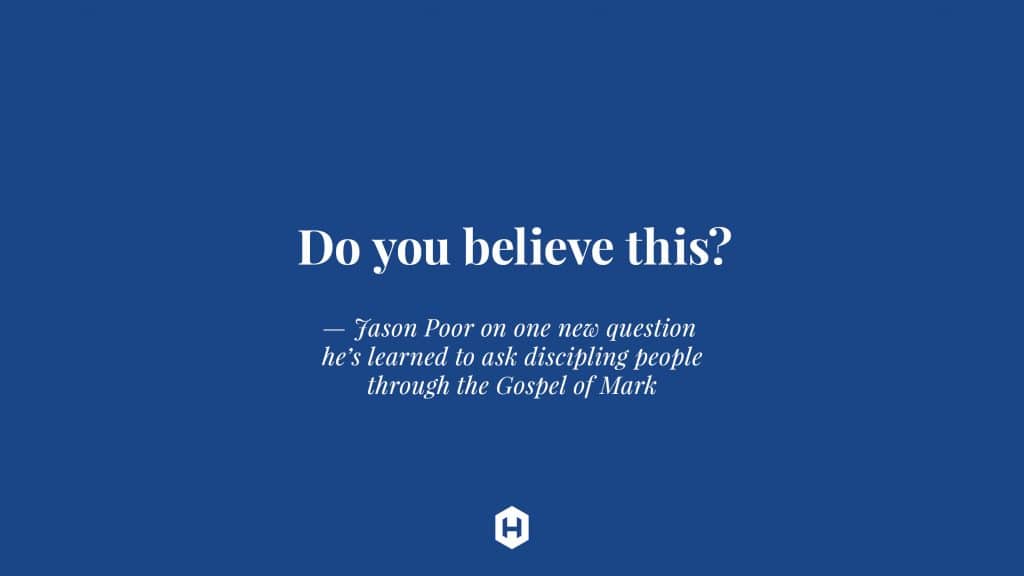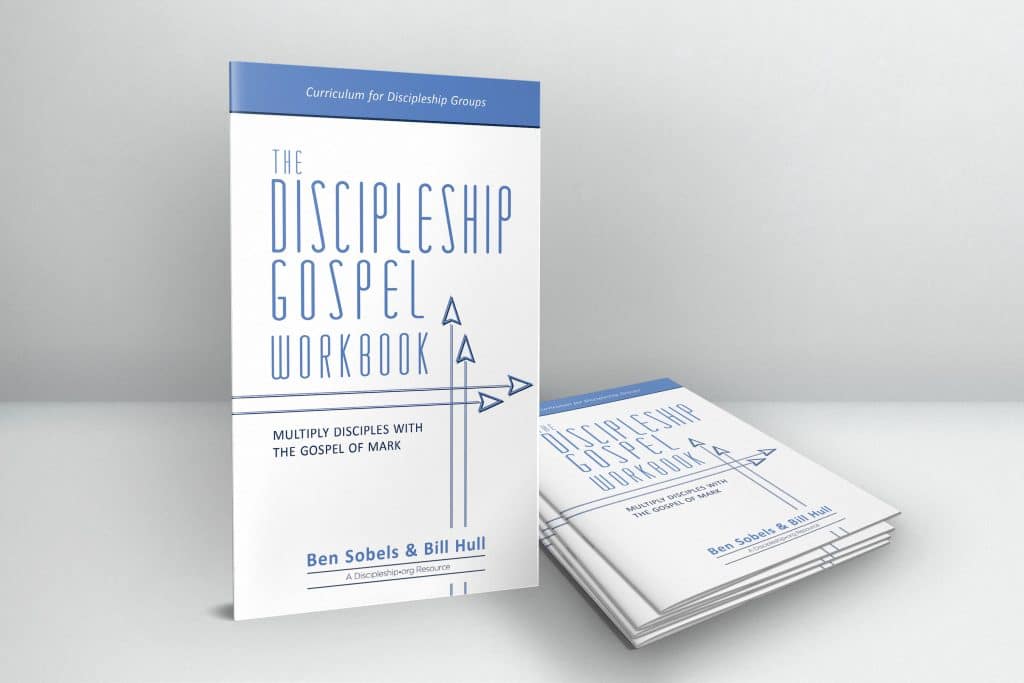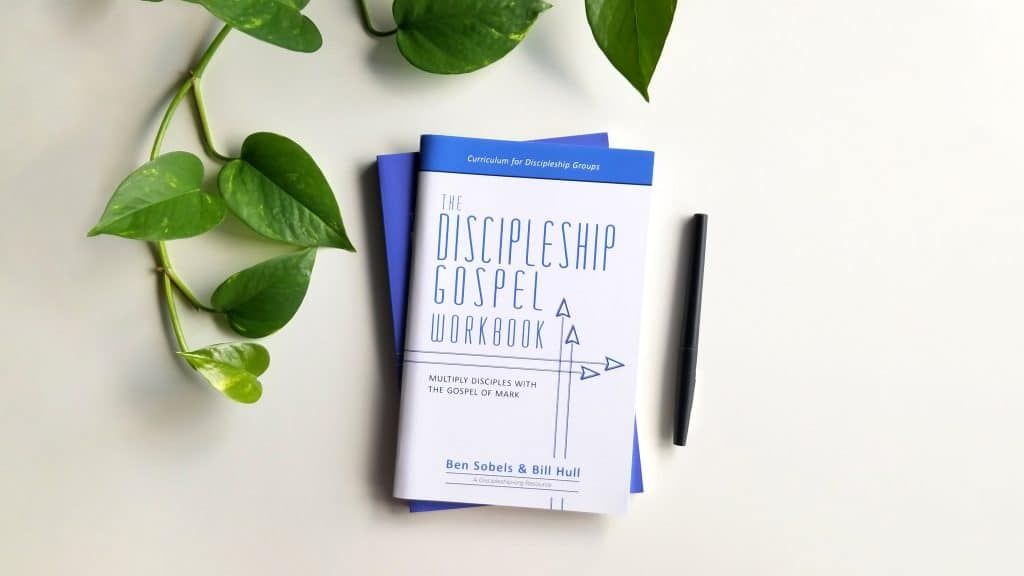In this interview, learn how Georgia pastor Jason Poor used The Discipleship Gospel Workbook by Ben Sobels and Bill Hull to make disciples. Stream here or listen on Spotify, Apple Podcasts, or Google Podcasts.
Subscribe to HIM Publications to get weekly blogs like this delivered to your inbox.
Chad Harrington: Jason, tell me about your church. Tell me where you are planted currently and what kind of church you have there.
Jason Poor: The church I most recently served at was a Southern Baptist church in west Georgia. It’s a small Southern Baptist church in the middle of nowhere.
CH: That’s awesome, man. And you’ve been using The Discipleship Gospel Workbook. Why did you originally choose this book as a disciple-making tool?
JP: I really love the simplicity of Mark’s Gospel. The reason we chose the book was because it would be something interactive and because there would be something that those being discipled could do ahead of time. We chose the book because it was something that we could wade through with them as we helped them walk through discipleship.
Honestly, the original reason I chose the book to use for discipleship and disciple-making was because of its simplicity.
In the past, what we’ve told other people is that they should read the Gospels. Traditionally, we point people to John’s Gospel, and I love John’s Gospel. It’s sometimes a tough gospel to understand if you’re relatively new to the Bible. Mark’s Gospel, however, is quick and it’s to the point and it’s simple. Mark tells things as they’re happening.
CH: Yeah. It’s funny you mention that because I was just talking with my wife about how a lot of times we’ll read John first and then we’ll read the other gospels. But John is so different, whereas Matthew, Mark, and Luke are down-to-earth.
JP: I think it’s really neat to be able to read through a chapter at a time with somebody. And then just ask them, “Do you believe this?” And whether they do or not, you just keep moving through with them and let the Holy Spirit do the work that he promised he would do.
CH: Yeah. And I think it’s helpful to have something like you said that people can sit with and wade through. The truth is the reality is that a lot of times people want a curriculum. This is a good tool, I mean, that’s why we created it—it’s a disciple-making tool.
Jason, I wanted you to give us a high-level overview of how you’ve used this tool. We’ve talked about the tool itself, but The Discipleship Gospel Workbook is something you’ve used as a tool.
How to Use The Discipleship Gospel Workbook as a Tool
JP: I’ve invited people I have a close relationship with already—and they would say that they’re Christians. They are members of churches and they participate regularly in worship activities with their church and with other churches, but there’s no fruit of discipleship or there’s essentially no disciple-making going on in their life—and I angle to try to help them understand that disciple-making is a part of what it means to be a disciple of Jesus.
Now, I’ve invited other people who identify themselves as Christians but really don’t have any interaction with the kingdom—such as they don’t belong to a church, they don’t interact, they don’t participate in kingdom activity.
I invite people to a simple reading of Mark. I say, “Hey, would you like to read the Gospel of Mark with me?”
The very first group that I started with was a group of the high schoolers, senior high guys at our church. What I told them, kind of boldly, was, “Hey, I’m gonna do this with you guys, and then I’m done. You guys are gonna need to pick this up, you guys are gonna need to take on this disciple-making work.”
So I left that with them. I’m still interacting with those guys and prodding them along, but I told them, “This is your responsibility, so you guys need to be inviting someone into the disciple-making process. You need to be thinking about who God is gonna put in front of you, somebody in your sphere of influence that you could invite to this process.”
CH: Yeah, well, I mean everyone’s got to make the choice for themselves. You can’t really put this on anyone, it’s like, okay, here’s the challenge, will you accept sort of thing?
JP: And they are high school age; they know what they believe. And so the initial challenge was, okay, so if you believe this for yourself, then you also ought to believe that is who Christ made us to be, disciple-makers. The work is for us to go and make disciples.
CH: So, Jason, as you worked with different groups, what are some specific stories of life change? We’ve talked about sort of group replication or possible group replication, but as you’ve been meeting with guys, what have you seen, you know, in terms of life change while you’re doing this study?
A Story of Life Change
JP: One story that’s cool, is actually an old student of mine from another church. He’s 23 now and his life has been really turned upside down in the last three to four years. I think we were eight or nine weeks into the study. Some of the conversation we were having about Scripture and about the person of Jesus and who he presents himself as when he’s interacting with either of the disciples or where the religious leaders was that Jesus alone is what’s necessary for a right relationship with God.
Jesus alone is what’s necessary for a relationship with God.
Something clicked with him about the conversation we’d been having. He said that it really resonated with him. He started thinking about a number of things in his life that he’d been adding to his relationship with Jesus. Having this other thing, or having Jesus and having these other people in my life to have a right relationship with God isn’t necessary. We don’t need those things for a right relationship with God. He said that realization really helped him to have a lot of peace.
And I thought, Well that’s great. That’s great that we’re reading about that and that’s what we’re hearing. We’re exposing the life of Jesus through Mark’s Gospel.
One of the realizations—I guess we could say it’s probably pretty elementary, but honestly, maybe that’s the place that we need to go back to with people who have said that they follow Jesus or have been believers for a long time—is this: Is Jesus enough, or are we continually taking Jesus and then adding other things to try to have peace in our lives, in order to have a right feeling or a right emotion about our relationship with God?
CH: Jason, what’s one thing new that you’ve learned about disciple-making by using this tool, The Discipleship Gospel Workbook?
One New Thing Jason’s Learned
JP: One new thing that I’ve learned specifically is something that I said to all of the groups when we started and then I repeat myself 16 times—so every time we meet. Sixteen times I repeat to them that with what we’re reading, whatever chapter, the first thing that we’re trying to do is we’re trying to answer the question, What does Jesus require of a disciple? What is Jesus calling his disciples to do, including us? Another thing that I’ve learned to say and ask after we read a chapter is,
“Do you believe this?”
That is, “Do you believe that any of this happened?”

We’re trying to answer the question, What does Jesus require of a disciple? What is he calling his disciples, us, to do?
And sometimes folks in our group who are Christians, or say they’re Christians, after reading Mark 1 or Mark 2 will say, “Yeah, I’m not really sure that I believe that, that this actually happened or that it could have happened.”
And surprisingly, it doesn’t shut everything down, it just gives me a reference point to know that there are some things that although they’re in the Bible and people have said, “Yeah, I believe the Bible,” whenever you ask them hard questions about why they believe that Jesus fed 5,000–15,000 people with one plate of food, they might sit back and scratch your head and say, you know, I’m not really sure about that but I’ll continue on.
And that’s the second part of the question, “Are you willing to continue to read this?”
Although you might not believe, or you have a question. If they are willing to believe that Jesus fed thousands of people with one plate of food, then they’ll be ready for when we get to Mark 15 and 16 with the death of Jesus on the cross, his burial, and his resurrection. I will say, yeah, I believe some wild stuff, like Jesus restoring sight to a blind man.
So, if that’s true, it is completely reasonable that the man who is claiming to be God rose from the dead. I’m willing to believe that.
CH: So Jason, do you have any advice for other people interested in using this resource?
Advice for Those Interested
JP: Make the goal your obedience. The goal in all this is just being obedient. And when the Holy Spirit prompts you to invite somebody to a discipleship relationship, specifically using this tool with Mark’s Gospel, just be obedient and make that the goal. Be obedient to what it means to be a disciple, and then be obedient to whatever the Holy Spirit is telling you to do because, and I’ll be honest with you, because this is still not easy. This is ridiculously difficult to try to manage.
The hard part is trying to manage all the time and logistics of when to meet and all the other things that are going on in that person’s life and their relationships. Because we can read the chapter and we can go through the workbook and ask and answer hard questions in about 50–55 minutes. We can get all that done. It’s the additional time of investing in them and being there for them when they need you.
Meet people where they are.
Meet them where they are, help them best by meeting them where they are. If they’ve never interacted with the Scriptures before, help them. Don’t complicate it. And don’t assume that they’ve known these things, even if they’re members of a church or they’ve been Christians for a long time. Just help them to walk through the Scriptures, answering their questions as best you can.
CH: Yeah, Jason, I like your approach where you’re like, okay, let’s not try and control outcomes. Obviously, we can affect outcomes, but really, the truth is when we’re trying to make disciples, just look at Jesus. He let them make a lot of mistakes. He let them kind of run wild at times, and in the end they deserted him in his most vulnerable moment.
And so I think there’s this facade of control that we sort of think we have, but the truth is, and this becomes clear really quickly, we don’t really have any control.
The best we can do is be obedient.
It’s not that replication isn’t important as a goal, but you’re saying the number one goal—because you can’t really control people—is obedience. Replication in and of itself is not the goal, the goal is obedience. You meet people where they’re at, and they make choices along the way. But at the end of the day, it’s like the rich young ruler who came up to Jesus in Mark. I mean, he walked away, but did he come back? We don’t know, so I think that’s pretty cool.
Take Responsibility
JP: No, I just really appreciate people taking on the responsibility of saying, “Something’s gotta change. Disciples don’t make themselves according to the Scriptures. We do the disciple-making work; that’s God’s plan for the church.” I’m really thankful for folks who will do the hard work, saying “If it’s a tool, if it’s a resource, whatever it is, we’ll invest time and resources to try to make these things available for people who desperately need them.”
CH: We’ve got such a great team and great authors who are practitioners, not just writers, but pretty much all the people we work with are leaders or pastors somewhere. We’re all using our skills to build up the body. I’m grateful for your stories, man. And power to you brother, keep on pressing on.
Subscribe to HIM Publications to get weekly blogs like this delivered to your inbox.




